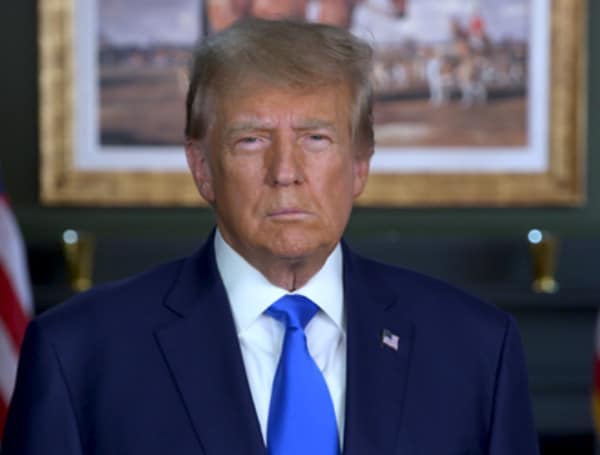Former President Donald Trump pleaded not guilty Thursday in Georgia and said he would not attend a hearing next week in a case that accuses him and others of trying to illegally overturn 2020 Georgia election results.
That means he won’t have to appear for an interview scheduled for next week by Fulton County Superior Court Judge Scott McAfee.
Trump’s decision to recuse himself avoids the dramatic trials that followed Trump’s three other criminal cases, in which the former president was forced into a courtroom under heavy security to plead “not guilty” publicly.
In the news: Tucker Carlson Says Trump’s Enemies May Contemplate Assassination If Other Attempts Fail
Trump and 18 others were indicted earlier this month in a 1-count indictment outlining an alleged scheme to influence Georgia voters who chose Democrat Joe Biden as the Republican presidential nominee.
Several other defendants had already dropped their charges when they entered court filings, saving them a trip to the downtown Atlanta courthouse.
Trump previously traveled to Georgia on August 2 to report to the Fulton County Jail, where he became the first former president to be kidnapped.
A case filed under Georgia’s Corporate Influenced and Corrupt Organizations Act, or RICO, is widespread and likely to be difficult to prosecute. Legal proceedings against several defendants have already begun.
On Tuesday, Attorney Ray Smith, who had represented former President Donald Trump in Georgia cases linked to the 2020 election, has entered a plea of not guilty.
Smith faces 12 counts related to the case, indicating a range of alleged offenses connected to election interference.
The arraignment process involves formally presenting the charges and allowing the defendants to enter their pleas. The former president is set to be arraigned first, followed by the other co-defendants.
In the news: Trump’s Trial Date Set In Federal 2020 Election Case
Former White House chief of staff Mark Meadows testified in court for five hours as part of his effort to move the case to federal court. Meadows argued that his actions in 2020 were within his responsibilities as a federal official, given his role as White House chief of staff at the time.
Meadows’ testimony was part of his attempt to move the case from the state court to federal court. This move could potentially alter the jurisdiction and legal proceedings of the case.
The presiding judge, U.S. District Judge Steve C. Jones, has not yet issued a ruling on the bid to transfer the case to federal court. The judge’s decision will determine whether the case remains in state court or moves to the federal court system.
On Monday, Republican Congressman Andrew Clyde of Georgia, said he plans to use the appropriations process to defund the prosecutorial authority of Special Counsel Jack Smith, Manhattan District Attorney Alvin Bragg, and Fulton County District Attorney Fani Willis.
“Americans’ hard-earned tax dollars have no place funding the radical Left’s nefarious election interference efforts,” said Clyde.
In the news: Mark Meadows Disputes Key Part Of Georgia Indictment During Hearing
“Together, Jack Smith, Alvin Bragg, and Fani Willis intentionally brought four sham indictments against the sitting president’s top political opponent, President Donald J. Trump, as the upcoming 2024 presidential election ramps up. These bogus charges are undoubtedly intended to smear and take down President Trump, as well as hinder his ability to campaign effectively. This overt election interference continues to undermine both our Republic and our fair system of justice,” said Clyde.
Clyde is actively crafting two amendments that he intends to introduce to the Commerce, Justice, Science, and Related Agencies (CJS) Appropriations Bill for Fiscal Year 2024.
According to a press release, one amendment would prohibit the use of federal funding for the prosecution of any major presidential candidate prior to the upcoming presidential election, scheduled for November 5th, 2024, while a second would prohibit funding for state prosecutions.
The amendments would apply to any candidate running for the presidency in the 2024 election who is considered a “major” candidate. It’s important to note that the definition of a “major presidential candidate” could vary and might be clarified within the text of the amendments.
Clyde, a member of the House Freedom Caucus, slammed the four indictments against Trump for being “overt election interference” and proposed that federal funding may not be allocated to the state or federal prosecution of “any major presidential candidate” until after November 5, 2024.
In the news: Pope Blasts ‘Backward’ US Catholics For Putting Ideology Above Faith During Private Meeting
“Due to my serious concerns about these witch hunt indictments against President Trump, I intend to offer two amendments to prohibit any federal funds from being used in federal or state courts to prosecute major presidential candidates prior to the 2024 election. The American people get to decide who wins the White House — not Deep State actors who have shamelessly attacked Donald Trump since he announced his first bid in 2015. It is imperative that Congress use its power of the purse to protect the integrity of our elections, restore Americans’ faith in our government, and dismantle our nation’s two-tiered system of justice. I’m fully committed to helping lead this effort, and I call on my House Appropriations colleagues to join me in this righteous fight,” said Clyde.
Android Users, Click To Download The Free Press App And Never Miss A Story. Follow Us On Facebook and Twitter. Signup for our free newsletter.
We can’t do this without your help; visit our GiveSendGo page and donate any dollar amount; every penny helps

